Share

College of Europe Podcast (Bruges)
Ce que l’Europe fait aux « citoyens » ordinaires. Goûts et dégoûts de l'Europe politique (Marine de Lasalle et Lancelot Veenendaal)
Ecoutez le nouvel épisode du podcast de la série Global Europe in a real new millenium !
Quel est le rapport des "citoyens ordinaires" à l’Europe ? A quoi pensent-ils ou elles quand on parle d’Europe ? Et qu'est-ce qu'évoque ce mot "Europe" pour eux ou elles ? A l'aube des élections européennes, voici autant de questions clés que Marine de Lasalle aborde dans cette discussion.
Marine de Lassalle est professeure de sociologie politique à Sciences Po Strasbourg et directrice du laboratoire « Sociétés, acteurs et gouvernement en Europe » (SAGE, CNRS / Université de Strasbourg). Ses travaux de recherche portent sur les perceptions de l’Europe, sur la gouvernance de l’Union européenne et sur la compétence politique.
Sa réflexion s’appuie notamment sur les résultats d’une vaste enquête menées auprès d’électeurs européens et présentés dans son livre, publié en 2022, "Faire parler d'Europe. Voies et formats des rapports institués au politique". Le propos de Marine de Lasalle et suivie d’une discussion avec Lancelot Veenendaal, alumni de la promotion David Sassoli et aujourd'hui Assistant académique du programme d'Etudes Générales européennes.
Cet épisode est produit dans le cadre du cycle de conférences "Global Europe in the real new millennium" organisée par le Programme d'études générales européennes du Collège d'Europe et dirigée par Didier Georgakakis.
Profitez de la conversation et n'oubliez pas de vous inscrire pour écouter notre prochain épisode.
More episodes
View all episodes
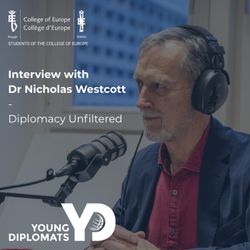
Interview with Dr Nicholas Westcott- Diplomacy Unfiltered
43:34|In the first episode of the Young Diplomats Society podcast, İrem İlksoy and Leah Tillmann-Morris interview Dr Nicholas Westcott about his diplomatic career and experience for over thirty years in the UK’s FCDO and the EU’s EEAS. Dr Westcott (Nick) gives his perspectives on what makes negotiations succeed or fail, what the UK and EU diplomatic services could learn from one another, the glamour and sacrifices of a diplomatic lifestyle, and how diplomacy is changing in the modern world.This podcast is produced by students of the College of Europe. The views and opinions expressed in this podcast are those of the individual participants and do not necessarily reflect the views of the College of Europe.”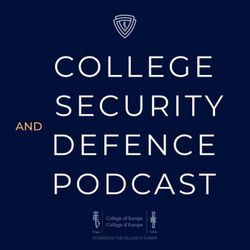
9. CSDP 9 - Conversation with HRVP Kaja Kallas: Insights for Future European Diplomats
08:04||Ep. 9In this short but insightful episode of CSDP, the first of the Victoria Amelina Promotion' season for the Security & Defence Society at the College of Europe, Giulio Croce and Léonie Bontoux sit with High Representative of the Union for Foreign Affairs and Security Policy Kaja Kallas, the EU’s chief diplomat, on the occasion of her presence as the guest speaker of the Victoria Amelina’s Opening Ceremony.In this dynamic and optimistic conversation, they discuss a variety of topics, including her personal vision of the role of the ‘EU chief diplomat’ compared to being a national elected politician, her main advice to aspiring diplomats and passionate EU students in these complex geopolitical times, and political commitment in younger generations. This podcast was recorded on the 27th of October and is produced by students of the College of Europe. The views and opinions expressed in this podcast are those of the individual participants and do not necessarily reflect the views of the College of Europe.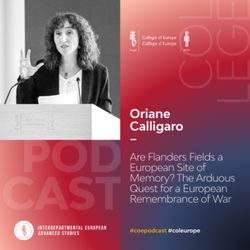
14. Publications at the College of Europe #14 – Professor Oriane Calligaro
01:36:13||Ep. 14In this episode of the College of Europe Podcast, students and faculty of the College welcomed Professor Oriane Calligaro, Associate Professor of Political Science at the Université Catholiquede Lille. Her work examines the history and politics of European integration, with particular attention to the cultural and symbolic dimensions of the European project — how the EU seeks to narrate itself through culture, values, and memory. She is the author of Negotiating Europe: EU Promotion of Europeanness since the 1950s and has published widely on questions of European identity, memory politics, and the role of culture in EU governance. In this lecture, entitled “Are Flanders Fields a European Site of Memory? The Arduous Quest for a European Remembrance of War,” Professor Calligaro reflected on the ways in which the memory of the First World War has been mobilised (and sometimes contested) in attempts to craft a European narrative. Her intervention opened a broader discussion on the possibilities, limits, and political implications of imagining a shared European remembrance of war. Keynote speech of the Flanders Fields Lecture and Study Trip of the College of Europe, this session and the discussions invite curious listeners and European politics enthusiasts to engage critically with how Europe interprets its past and how these memory practices resonate with contemporary and future challenges for the European project.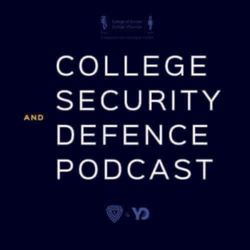
8. CSDP 8 - Great Power Politics in the Sahel: Europe’s Role and Choices
32:14||Ep. 8In this eighth episode of CSDP, Antonio Tintoré Vicent is joined by Ambassador João Cravinho to discuss great power politics in the Sahel and what is at stake for Europe. Ambassador Cravinho is the EU Special Representative for the Sahel and formerly served as Portugal’s Minister of Foreign Affairs and Minister of Defence.The conversation explores the Sahel as a theatre of global competition, assessing the EU’s strategic interests alongside the United States’ diminished role, Russia’s military-focused presence, and China’s growing economic influence. The discussion also considers how local actors are gaining new leverage and what Europe must do to make its broader, long-term offer of political, economic, and institutional engagement more attractive.This podcast was recorded on the 17th of March 2025 and is produced by students of the College of Europe. The views and opinions expressed in this podcast are those of the individual participants and do not necessarily reflect the views of the College of Europe.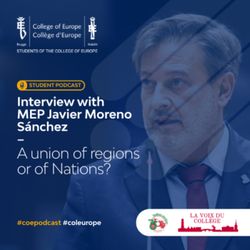
Spain’s Role in the European Union
20:05|This is the fifth episode of the podcast Europe: A Union of Regions or of Nations?, brought to you by La Voix du Collège.In this podcast, we look at the role of different Member States within the European Union, examining how national and European interests interact. Each Member State brings its own priorities and plays a different role in shaping European Integration.Today, our guest is MEP Javier Moreno Sánchez, and we discuss with him the question: What is Spain’s role in the European Union?Stay tuned for our next episode to look at another Member State!This podcast is produced by students of the College of Europe. The views and opinions expressed in this podcast are those of the individual participants and do not necessarily reflect the views of the College of Europe.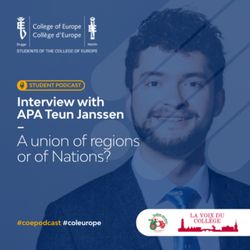
The Netherlands’ Role in the European Union
31:44|This is the fourth episode of the podcast Europe: A Union of Regions or of Nations?, brought to you by La Voix du Collège.In this podcast, we look at the role of different Member States within the European Union, examining how national and European interests interact. Each Member State brings its own priorities and plays a different role in shaping European Integration.Today, our guest is APA Teun Janssen, and we discuss with him the question: What is the Netherlands’ role in the European Union?Stay tuned for our next episode to look at another Member State!This podcast is produced by students of the College of Europe. The views and opinions expressed in this podcast are those of the individual participants and do not necessarily reflect the views of the College of Europe.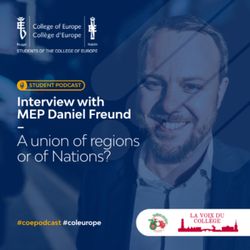
Germany’s Role in the European Union
27:16|This is the third episode of the podcast Europe: A Union of Regions or of Nations?, brought to you by La Voix du Collège.In this podcast, we look at the role of different Member States within the European Union, examining how national and European interests interact. Each Member State brings its own priorities and plays a different role in shaping European Integration.Today, our guest is MEP Daniel Freund, and we discuss with him the question: What is Germany’s role in the European Union?Stay tuned for our next episode to look at another Member State!This podcast is produced by students of the College of Europe. The views and opinions expressed in this podcast are those of the individual participants and do not necessarily reflect the views of the College of Europe.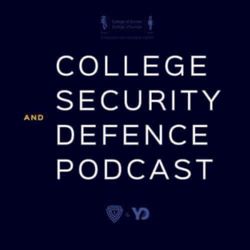
7. CSDP 7 - European Economic Statecraft in a World of Weaponised Interdependence
41:23||Ep. 7In this seventh episode of CSDP, Antonio Tintoré Vicent is joined by Professor Abraham Newman to discuss the rise of geoeconomics and how Europe should adapt to an era of weaponised interdependence. Professor Newman teaches at Georgetown University and is co-author of Underground Empire: How America Weaponized the World Economy, a landmark book on the geopolitics of globalisation and control over chokepoints in the international system. This conversation covers the strategic rationale behind Trump’s trade wars, the debate around weaponising interdependence, and the institutional reforms Europe needs to stay competitive in an age where economic power is increasingly politicised. Drawing on recent visits to Japan and Taiwan, Professor Newman also shares insights into how these debates are playing out in other democracies. Finally, the episode considers the future of the WTO and efforts to build international norms around economic coercion.This podcast is produced by students of the College of Europe. The views and opinions expressed in this podcast are those of the individual participants and do not necessarily reflect the views of the College of Europe.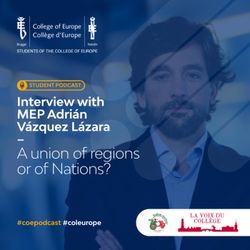
Spain’s Role in the European Union
21:22|This is the second episode of the podcast Europe: A Union of Regions or of Nations?, brought to you by La Voix du Collège.In this podcast, we look at the role of different Member States within the European Union, examining how national and European interests interact. Each Member State brings its own priorities and plays a unique role in shaping European Integration.Today, our guest is MEP Adrián Vázquez Lázara, and we discuss with him the question: What is Spain’s role in the European Union?Stay tuned for our next episode to look at another Member State!This podcast is produced by students of the College of Europe. The views and opinions expressed in this podcast are those of the individual participants and do not necessarily reflect the views of the College of Europe.